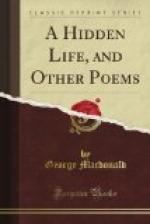Look! there they come,
Poor amid poverty; she with her gown
Drawn over her meek head; he trying much,
But fruitless half, to shield her from the rain.
They enter the wide gates, amid the jar,
And clash, and shudder of the awful force
That, conquering force, still vibrates on, as if
With an excess of power, hungry for work.
With differing strength to different tasks they part,
To be the soul of knowledge unto strength;
For man has eked his body out with wheels,
And cranks, and belts, and levers, pinions, screws—
One body all, pervaded still with life
From man the maker’s will. ’Mid keen-eyed
men,
Thin featured and exact, his part is found;
Hers where the dusk air shines with lustrous eyes.
And there they laboured through the murky day,
Whose air was livid mist, their only breath;
Foul floating dust of swift revolving wheels
And feathery spoil of fast contorted threads
Making a sultry chaos in the sun.
Until at length slow swelled the welcome dark,
A dull Lethean heaving tide of death,
Up from the caves of Night to make an end;
And filling every corner of the place,
Choked in its waves the clanking of the looms.
And Earth put on her sleeping dress, and took
Her children home into its bosom-folds,
And nursed them as a mother-ghost might sit
With her neglected darlings in the dark.
So with dim satisfaction in their hearts,
Though with tired feet and aching head, they went,
Parting the clinging fog to find their home.
It was a dreary place. Unfinished walls,
Far drearier than ruins overspread
With long-worn sweet forgetfulness, amidst
Earth-heaps and bricks, rain-pools and ugliness,
Rose up around, banishing further yet
The Earth, with its spring-time, young-mother smile,
From children’s eyes that had forgot to play.
But though the house was dull and wrapt in fog,
It yet awoke to life, yea, cheerfulness,
When darkness oped a fire-eye in the grate,
And the dim candle’s smoky flame revealed
A room which could not be all desolate,
Being a temple, proven by the signs
Seen in the ancient place. For here was light;
And blazing fire with darkness on its skirts;
Bread; and pure water, ready to make clean,
Beside a chest of holiday attire;
And in the twilight edges of the light,
A book scarce seen; and for the wondrous veil,
Those human forms, behind which lay concealed
The Holy of Holies, God’s own secret place,
The lowly human heart wherein He dwells.
And by the table-altar they sat down
To eat their Eucharist, God feeding them:
Their food was Love, made visible in Form—
Incarnate Love in food. For he to whom
A common meal can be no Eucharist,
Who thanks for food and strength, not for the love
That made cold water for its blessedness,
And wine for gladness’ sake, has yet to learn
The heart-delight of inmost thankfulness
For innermost reception.




